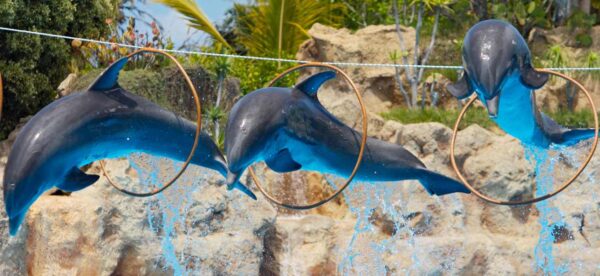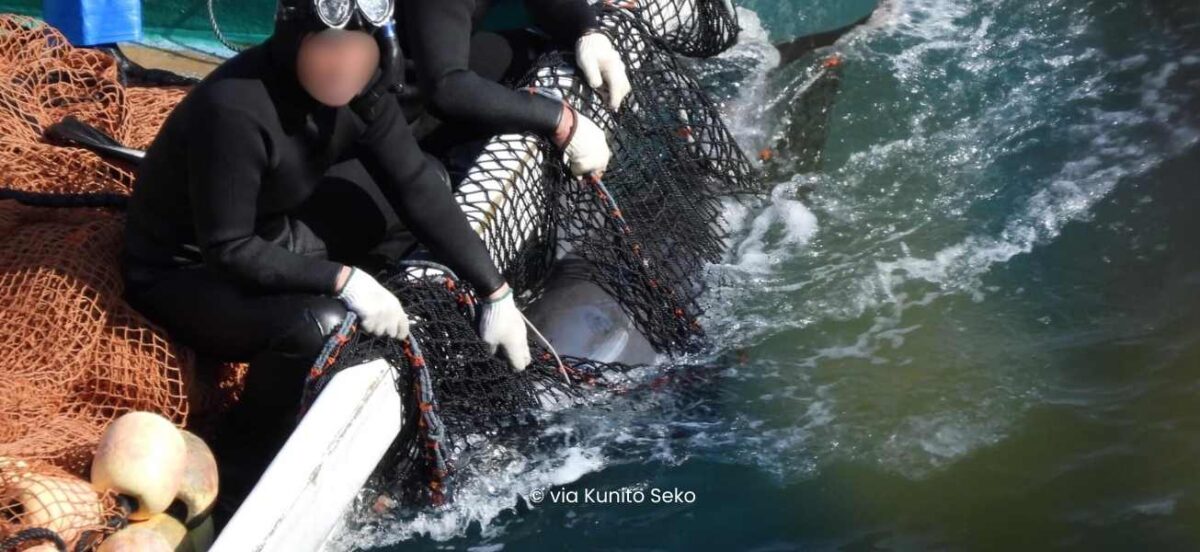The link between Taiji and marine parks
Every year, from September to March, dolphins are captured in Taiji, Japan, in one of the most notorious hunts in the world. While some are slaughtered for meat, the most lucrative part of the hunts is the sale of live dolphins to marine parks.
The global trade in wild-caught dolphins fuels the continuation of the Taiji dolphin hunts. Without demand for captive dolphins, these hunts would not be financially viable.
Many of the dolphins taken from Taiji do not stay in Japan. They are transported to marine parks in Thailand, China, the Middle East, and beyond, where they spend the rest of their lives in tanks, performing for tourists. The best way to stop the Taiji hunts is to cut off demand for captive dolphins.
1. Don’t support dolphin shows and swim-with-dolphin attractions
The biggest driver of the Taiji hunts is tourism demand for dolphin performances and interactions. Many people visit marine parks without realising that the dolphins they see may have been taken from the wild.
How to choose ethical alternatives
Instead of supporting captivity, choose wild dolphin watching experiences. Seeing dolphins in their natural habitat is not only more ethical but also far more rewarding than watching them perform in an artificial setting.
If booking a dolphin tour, look for companies that:
-
- Follow wildlife conservation guidelines
- Do not allow touching, feeding, or swimming with dolphins
- Focus on education and conservation rather than entertainment
The same principles for ethical dolphin watching apply anywhere in the world – whether you are in Thailand, Japan, or Australia. To help you identify a responsible tour, take a look at our dolphin watching guide, which outlines what to look for when choosing an ethical experience.
Choosing ethical experiences is an easy way to show marine parks that the demand for captive shows is declining, and sends a clear message that dolphins belong in the wild, not in tanks.
2. Spread awareness about Taiji and the live dolphin trade
Many people are unaware that marine parks buy dolphins from Taiji. This lack of awareness is what allows the industry to continue operating without scrutiny.
How you can help raise awareness
- Talk to friends and family – Many people who visit marine parks would not do so if they knew the truth about where the dolphins come from.
- Share information online – Social media is a powerful tool for raising awareness. Sharing facts about the Taiji hunts and the connection between tourism and captivity can help inform more people. Follow us on instagram if you’d like to amplify our message.
- Leave reviews – If you see travel companies promoting captive dolphin attractions, leave a respectful review explaining why captivity is harmful and why ethical alternatives are better. With our friends at World Animal Protection, we have created a report highlighting the key players, like Traveloka, who are profiting from this cruel trade.
The more people who understand the reality of the Taiji hunts, the harder it will be for marine parks to profit from this trade. The more voices that are raised, the more pressure we can build.

Photo credit: Canva Pro
3. Take the pledge: Say no to captivity
One of the strongest actions you can take is to publicly commit to never visiting marine parks or captive dolphin attractions. When more people pledge to reject captivity, it sends a message to travel companies, marine parks, and governments that public attitudes are changing.
Ways to take a stand against captivity
- Sign a pledge not to visit dolphinariums and encourage others to do the same. Share it on your social media, send it in an email – use your voice to help us gain momentum.
- Ask travel companies to remove captive dolphin attractions from their offerings. The simplest way to do this is to call them out on social media and post comments. If you want to take an extra step, send an email with your thoughts!
- If you are travelling, research your destination’s stance on dolphin captivity and avoid locations that support it.
- Support travel brands that actively promote ethical wildlife tourism and do not include captive dolphin venues in their packages.
Consumer demand is powerful. Several travel companies have already adopted animal welfare policies due to public pressure. Continued advocacy can ensure that more companies follow suit.
4. Support our fight against the Taiji live dolphin trade
The Taiji dolphin hunts continue because of tourism demand. Every time someone buys a ticket to a dolphin show, they are unknowingly supporting a supply chain that begins with violent captures in Japan.
But there is hope. By choosing ethical dolphin experiences, refusing to support marine parks, spreading awareness, and advocating for legal change, we can help dismantle the captive dolphin industry.
Dolphins belong in the wild, not in tanks. The more people who recognise this, the closer we get to ending the Taiji hunts for good.
Every action – whether it’s choosing ethical tourism, educating others, or advocating for legal change – brings us closer to ending dolphin captivity. If you want to do more, consider supporting our work to expose and disrupt the live dolphin trade.
Final thoughts: A future without dolphin captivity
The Taiji dolphin hunts continue because of tourism demand. Every time someone buys a ticket to a dolphin show, they are unknowingly supporting a supply chain that begins with violent captures in Japan.
But there is hope. By choosing ethical dolphin experiences, refusing to support marine parks, spreading awareness, and advocating for legal change, we can help dismantle the captive dolphin industry.
Dolphins belong in the wild, not in tanks. The more people who recognise this, the closer we get to ending the Taiji hunts for good.
If you still want to see dolphins, make sure you choose an ethical experience. Our dolphin watching guide explains what to look for when selecting a responsible tour – these principles apply no matter where in the world you are.
